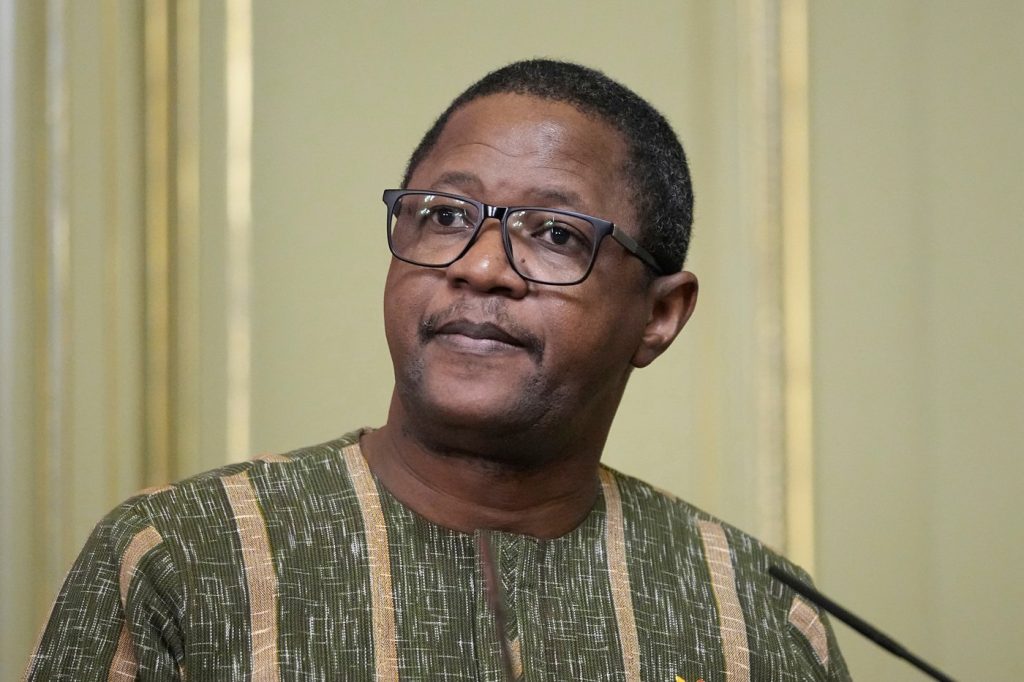World
Burkina Faso Rejects U.S. Deportation Proposal Amid Tensions

Burkina Faso has officially declined a proposal from the Trump administration to accept deportees from the United States. The request involved the acceptance of non-citizens expelled by the U.S., alongside Burkinabe nationals. Burkina Faso’s Foreign Minister, Karamoko Jean-Marie Traoré, articulated the country’s stance during a national television address on Thursday, describing the proposal as “indecent” and inconsistent with the values of dignity central to the vision of Captain Ibrahim Traoré, the nation’s military leader.
The timing of the announcement was notable, coinciding with the U.S. Embassy in Ouagadougou suspending most visa services for residents of Burkina Faso. Visa applications are now being redirected to the U.S. embassy in neighboring Togo. The embassy has not provided a reason for this change, but Traoré cited a diplomatic note from the U.S. accusing Burkinabe nationals of violating visa usage rules. He characterized the embassy’s actions as a potential “pressure tactic,” stating emphatically, “Burkina Faso is a land of dignity, not deportation.”
The broader context of this diplomatic friction involves the U.S. government’s recent actions regarding deportations to Africa. Since July, over 40 individuals have been sent to various African nations as part of a largely undisclosed third-country deportation program. Reports indicate that the Trump administration has established agreements with at least five African countries, including Eswatini, South Sudan, Rwanda, and Ghana, to facilitate these deportations.
Rights organizations have expressed significant concerns about the program. Notably, eleven of the fourteen deportees sent to Ghana last month have filed lawsuits against the government, alleging inhumane conditions at a military facility located on the outskirts of the capital, Accra. Human Rights Watch has reported that the U.S. offered financial incentives to some African nations for accepting deportees, revealing that Eswatini is set to receive $5.1 million for migration and border management, while Rwanda will receive $7.5 million.
Currently, six deportees are detained in an unspecified facility in South Sudan, and it remains unclear where seven deportees are being held in Rwanda. The U.S. Department of Homeland Security and the embassy in Ouagadougou did not respond immediately to requests for comment on the situation.
The rejection of the U.S. proposal by Burkina Faso underscores the delicate nature of international relations surrounding migration policy. As deportations continue under the third-country program, the implications for human rights and the treatment of deportees remain a pressing concern for advocates and governments alike.
-

 Science3 months ago
Science3 months agoToyoake City Proposes Daily Two-Hour Smartphone Use Limit
-

 Health4 months ago
Health4 months agoB.C. Review Reveals Urgent Need for Rare-Disease Drug Reforms
-

 Top Stories4 months ago
Top Stories4 months agoPedestrian Fatally Injured in Esquimalt Collision on August 14
-

 Technology3 months ago
Technology3 months agoDark Adventure Game “Bye Sweet Carole” Set for October Release
-

 World3 months ago
World3 months agoJimmy Lai’s Defense Challenges Charges Under National Security Law
-

 Lifestyle4 months ago
Lifestyle4 months agoVictoria’s Pop-Up Shop Shines Light on B.C.’s Wolf Cull
-

 Technology3 months ago
Technology3 months agoKonami Revives Iconic Metal Gear Solid Delta Ahead of Release
-

 Technology3 months ago
Technology3 months agoApple Expands Self-Service Repair Program to Canada
-

 Technology3 months ago
Technology3 months agoSnapmaker U1 Color 3D Printer Redefines Speed and Sustainability
-

 Technology3 months ago
Technology3 months agoAION Folding Knife: Redefining EDC Design with Premium Materials
-

 Technology4 months ago
Technology4 months agoSolve Today’s Wordle Challenge: Hints and Answer for August 19
-

 Business4 months ago
Business4 months agoGordon Murray Automotive Unveils S1 LM and Le Mans GTR at Monterey









